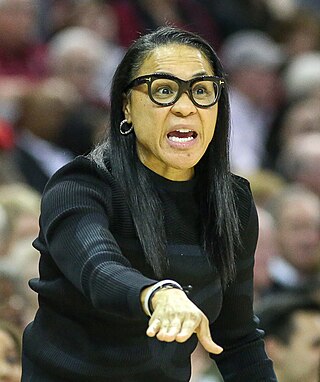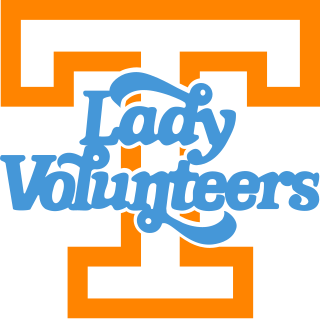Related Research Articles

The NCAA Division I women's basketball tournament, sometimes referred to as Women's March Madness, is a single-elimination tournament played each spring in the United States, currently featuring 68 women's college basketball teams from the Division I level of the National Collegiate Athletic Association (NCAA), to determine the national championship.

Dawn Michelle Staley is an American basketball coach and former player who is the head coach for the South Carolina Gamecocks women's basketball team. A point guard, she played college basketball for the Virginia Cavaliers and spent eight seasons in the Women's National Basketball Association (WNBA), primarily with the Charlotte Sting. Staley also played on the United States women's national basketball team, winning three gold medals at the Olympic Games from 1996 to 2004, and was the head coach of the team that won an Olympic gold medal in 2021. She is the first person to win the Naismith Award as both a player and a coach.

Heather Marie Quella is a former professional basketball player and is the twin sister of Heidi (Burge) Horton.
The Virginia Cavaliers men's basketball team is the intercollegiate men's basketball program representing the University of Virginia. The school competes in the Atlantic Coast Conference (ACC) in Division I of the National Collegiate Athletic Association (NCAA). Virginia has won the NCAA Championship, two National Invitation Tournaments, and three ACC tournament titles. The team plays home games at the on-campus John Paul Jones Arena (14,623) which opened in 2006. They have been called the Cavaliers since 1923, predating the Cleveland Cavaliers of the NBA by half a century.

The Tennessee Lady Volunteers basketball team represents the University of Tennessee in Knoxville, Tennessee in NCAA women's basketball competition. The team has been a contender for national titles for over forty years, having made every NCAA Women's Division I Basketball Championship tournament since the NCAA began sanctioning women's sports in the 1981–82 season.

The 1990 NCAA Division I women's basketball tournament began on March 11 and ended on April 1. The tournament featured 48 teams. The Final Four consisted of Virginia, Stanford, Auburn, and Louisiana Tech, with Stanford defeating Auburn 88-81 to win its first NCAA title. Stanford's Jennifer Azzi was named the Most Outstanding Player of the tournament.

The 1991 NCAA Division I women's basketball tournament began on March 13 and ended on March 31. The tournament featured 48 teams. The Final Four event was hosted by the University of New Orleans, and held at the Lakefront Arena in New Orleans. The Final Four teams consisted of Tennessee, Stanford, Connecticut, and Virginia, with Tennessee defeating Virginia 70-67 (OT) to win its third NCAA title. Virginia's Dawn Staley was named the Most Outstanding Player of the tournament.

The 1992 NCAA Division I women's basketball tournament began on March 18 and ended on April 5. The tournament featured 48 teams. The Final Four consisted of Virginia Cavaliers, Stanford Cardinal, Southwest Missouri State Lady Bears, and Western Kentucky Lady Toppers, with Stanford defeating Western Kentucky 78–62 to win its second NCAA title. Stanford's Molly Goodenbour was named the Most Outstanding Player of the tournament.

The South Carolina Gamecocks women's basketball team represents the University of South Carolina and competes in the Southeastern Conference (SEC). Under current head coach Dawn Staley, the Gamecocks have been one of the top programs in the country, winning NCAA Championships in 2017, 2022, and 2024. The program also enjoyed success under head coach Nancy Wilson during the 1980s in the Metro Conference, when it won five regular season conference championships and three conference tournament championships.

The 1995 NCAA Division I women's basketball tournament featured 64 teams. The Final Four consisted of Connecticut, Tennessee, Stanford, and Georgia. Connecticut defeated Tennessee 70–64 to win its first NCAA title and complete a 35–0 undefeated season.
The UConn Huskies women's basketball team is the college basketball program representing the University of Connecticut in Storrs, Connecticut, in NCAA Division I women's basketball competition. They currently play in the Big East Conference.
The NC State Wolfpack women's basketball team represents North Carolina State University in NCAA Division I women's basketball.

The 2017–18 Virginia Cavaliers men's basketball team represented the University of Virginia during the 2017–18 NCAA Division I men's basketball season. The team was led by head coach Tony Bennett in his ninth year, and played their home games at John Paul Jones Arena in Charlottesville, Virginia as members of the Atlantic Coast Conference.

The 2018–19 Virginia Cavaliers men's basketball team represented the University of Virginia during the 2018–19 NCAA Division I men's basketball season. The team was led by head coach Tony Bennett in his tenth year, and played their home games at John Paul Jones Arena in Charlottesville, Virginia as members of the Atlantic Coast Conference.

The 2022 NCAA Division I women's basketball tournament was a single-elimination tournament of 68 teams to determine the National Collegiate Athletic Association (NCAA) Division I college basketball national champion for the 2021–22 NCAA Division I women's basketball season. The 40th edition of the tournament began on March 16, 2022, and concluded with the championship game on April 3 at Target Center in Minneapolis, where the South Carolina Gamecocks defeated the UConn Huskies 64–49 to win their second NCAA title, and handing UConn its first loss in the championship game. This tournament marked the introduction of the "First Four" round and an expansion of the field of participants from 64 teams to 68, mirroring the men's tournament since 2011.
The 1990–91 Virginia Cavaliers women's basketball team represented the University of Virginia during the 1990–91 NCAA Division I women's basketball season. The Cavaliers were led by 14th-year head coach Debbie Ryan, and played their home games at University Hall in Charlottesville, Virginia as members the Atlantic Coast Conference.

The 2024 NCAA Division I women's basketball championship game was the final game of the 2024 NCAA Division I women's basketball tournament. It determined the champion of the 2023–24 NCAA Division I women's basketball season and was contested by the Iowa Hawkeyes from the Big Ten Conference and the South Carolina Gamecocks from the Southeastern Conference. The game was played on April 7, 2024, at Rocket Mortgage FieldHouse in Cleveland, Ohio. South Carolina defeated Iowa 87–75 to capture the third national championship in program history. Iowa finished as runner-up for the second season in a row.
The 1995 NCAA Division I women's basketball championship game was the final game of the 1995 NCAA Division I women's basketball tournament. It determined the champion of the 1994–95 NCAA Division I women's basketball season and was contested by the Connecticut Huskies and the Tennessee Lady Volunteers. The game was played on April 2, 1995, at Target Center in Minneapolis, Minnesota. After trailing 38–32 at halftime, No. 1 UConn defeated No. 3 Tennessee 70–64 to capture the NCAA national championship, and complete the second unbeaten season in women's NCAA history. Connecticut's Rebecca Lobo was named the tournament's Most Outstanding Player.
The 2002 NCAA Division I women's basketball championship game was the final game of the 2002 NCAA Division I women's basketball tournament. It determined the champion of the 2001–02 NCAA Division I women's basketball season and was contested by the Connecticut Huskies and the Oklahoma Sooners. The game was played on March 31, 2002, at the Alamodome in San Antonio, Texas. After leading 42–30 at halftime, No. 1 UConn defeated No. 4 Oklahoma 82–70 to capture the program's third National championship, and complete the fourth unbeaten season in women's NCAA history. Connecticut's Swin Cash was named the tournament's Most Outstanding Player.
The 1991–92 Virginia Cavaliers women's basketball team represented the University of Virginia during the 1991–92 NCAA Division I women's basketball season. The Cavaliers were led by 15th-year head coach Debbie Ryan, and played their home games at University Hall in Charlottesville, Virginia as members the Atlantic Coast Conference.
References
- ↑ "N.C.A.A. TOURNAMENT; For Connecticut Women, a Perfect Ending". The New York Times . April 1, 1991. Retrieved April 25, 2024.
- ↑ "Virginia Advances to Women's Final". The Washington Post . March 31, 1991. Retrieved April 25, 2024.
- ↑ "After Overpowering Stanford, UConn Is Ready for Tennessee". The Los Angeles Times . March 30, 1991. Retrieved April 25, 2024.